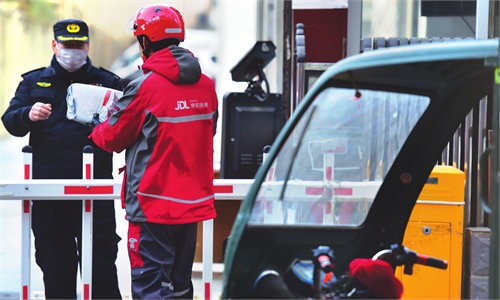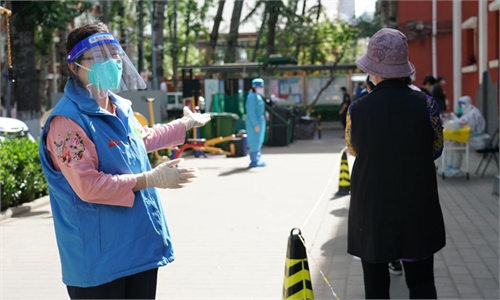Beijingers volunteer for strengthened dynamic-zero measures in arduous Omicron fight
What are residents of China's capital doing and thinking while the city continues the battle against COVID-19?
The current wave of the Omicron variant has hit Beijing hard, with the most severe and complicated epidemic prevention and control situation in its history. However, the confidence and strength of the city's nearly 22 million residents to help each other is effectively building a stronger barrier against the epidemic.
Instead of the resentment and self-abandonment imagined by some Western media, the general public in Beijing maintained high trust in the government and actively cooperated with preventive measures such as frequent nucleic acid screenings.
"Beijing, the gateway and political center of China, must not lose ground in the battle against the epidemic." This is strongest shared belief of the residents at the moment.
'Chaoyang masses' at service
Residents of Chaoyang district have long had an image of "Chaoyang masses" - retired "aunties" and "uncles" in residential compounds with red armbands overseeing community management. But the story of Yang Na, a COVID-19 epidemic prevention and control volunteer at Xiaohongmen community of Chaoyang district, went viral on Chinese social media because of a "drag show" she performed on her wedding day in a lockdown community.
There was no wedding dress or banquet on May 8, Yang's wedding day. At 11:30 am, after finishing her work, Yang took off her protective clothing and hurried to the flat of her in-laws in the same compound. She put on her husband's red T-shirt and headed to a dinner party with her family to complete a special wedding ceremony in the simplest way. At 1 pm, she was back on duty and continued to provide medication to residents.
"Although it is a pity that we could not hold a grand wedding, it is also a memorable thing to spend the first day of our marriage under the post of epidemic prevention and control," Yang told the Global Times.
In April, the sudden outbreak in Beijing disrupted Yang's wedding plans, which she had prepared for a year in advance. However, she decisively responded to Beijing's call by canceling the feast and signed up as a community volunteer to provide residents with services such as purchasing medicine, picking up and delivering packages, and entering homes for nucleic acid sampling.
There are 14 buildings in Yang's community, each with about 800 residents, but so far there have been no complaints.
"Chaoyang residents have always had a sense of responsibility and duty. Not only can the residents of Beijing's largest district contain criminal offenders, but also our performance against the epidemic was quite excellent," Yang said.
In the past, people who offered tip-offs were dubbed Chaoyang vigilantes, and they reported high-profile entertainers engaged in illicit activities such as prostitution and drug use. They were later called jokingly by netizens as a mysterious force that could match famous international intelligence organizations like as the MI6.
It has been proven that when Chaoyang's residents focused their attention on the struggle against the virus, with understanding, support and cooperation, as well as actively contributing their own resources to the COVID-19 prevention and control work, a strong anti-epidemic synergy was formed.
"There are volunteers joining us continuously every day," said Cheng Chen, a post-1990s community youth club social worker, now a group leader of volunteer working in one of the nucleic acid testing sites in Chaoyang's Taiyanggong community, who wake up at 5:30 am every day to get to work.
The testing site in front of the Taiyanggong Community's Party branch is the "battleground" for Cheng to contain the virus.
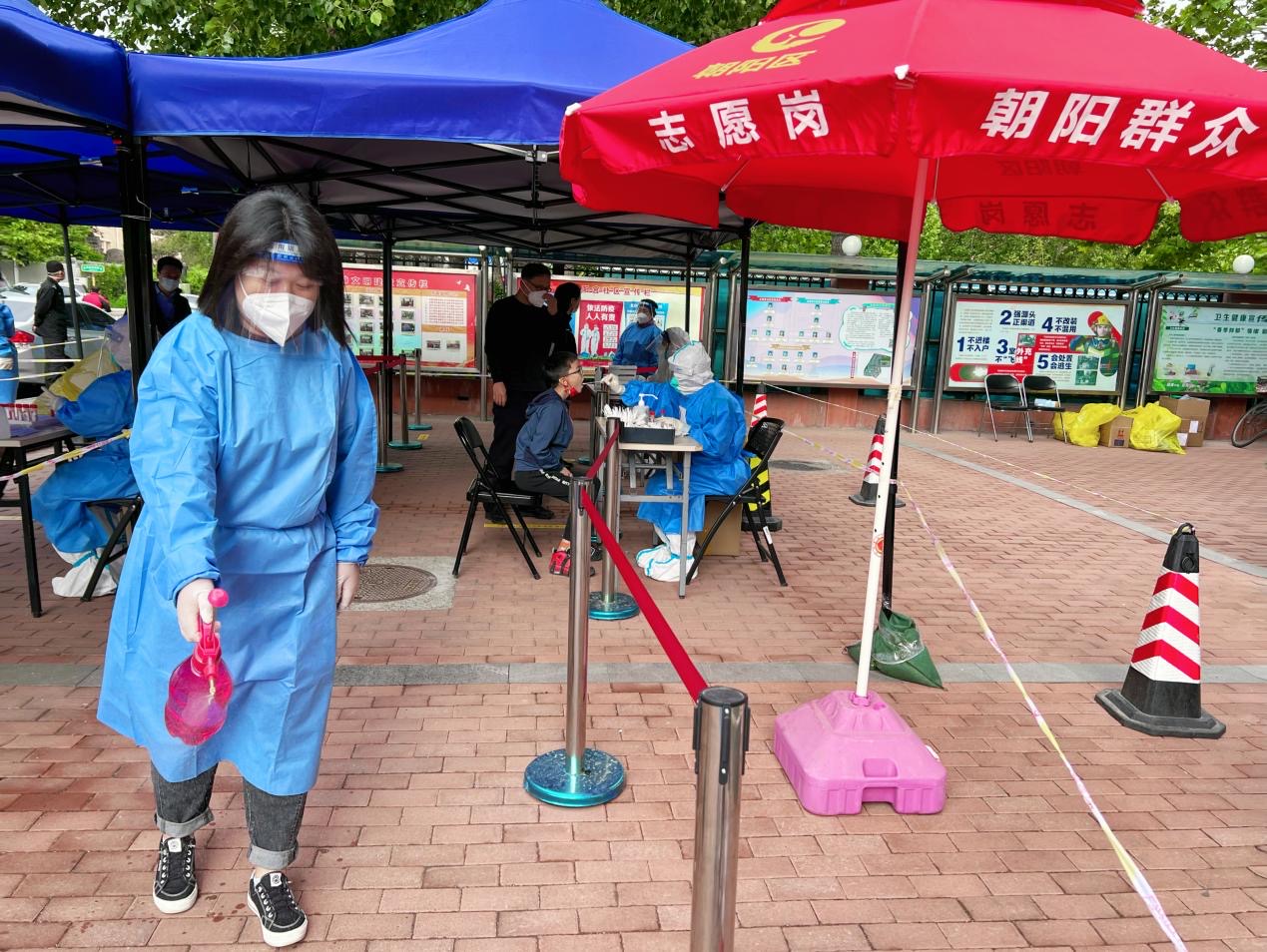
"The 'Chaoyang masses' have a new look now, with many young people who work from home coming to ask what they can do to help our work during the ongoing nucleic acid testing," Cheng said, noting that up to now, her community has done over 15 rounds of nucleic acid tests.
"The queue is more and more organized and people's mood is growingly optimistic, and standing on the frontline with the 'Chaoyang masses' has especially motivated me to work and has given me inspiration," Cheng said.
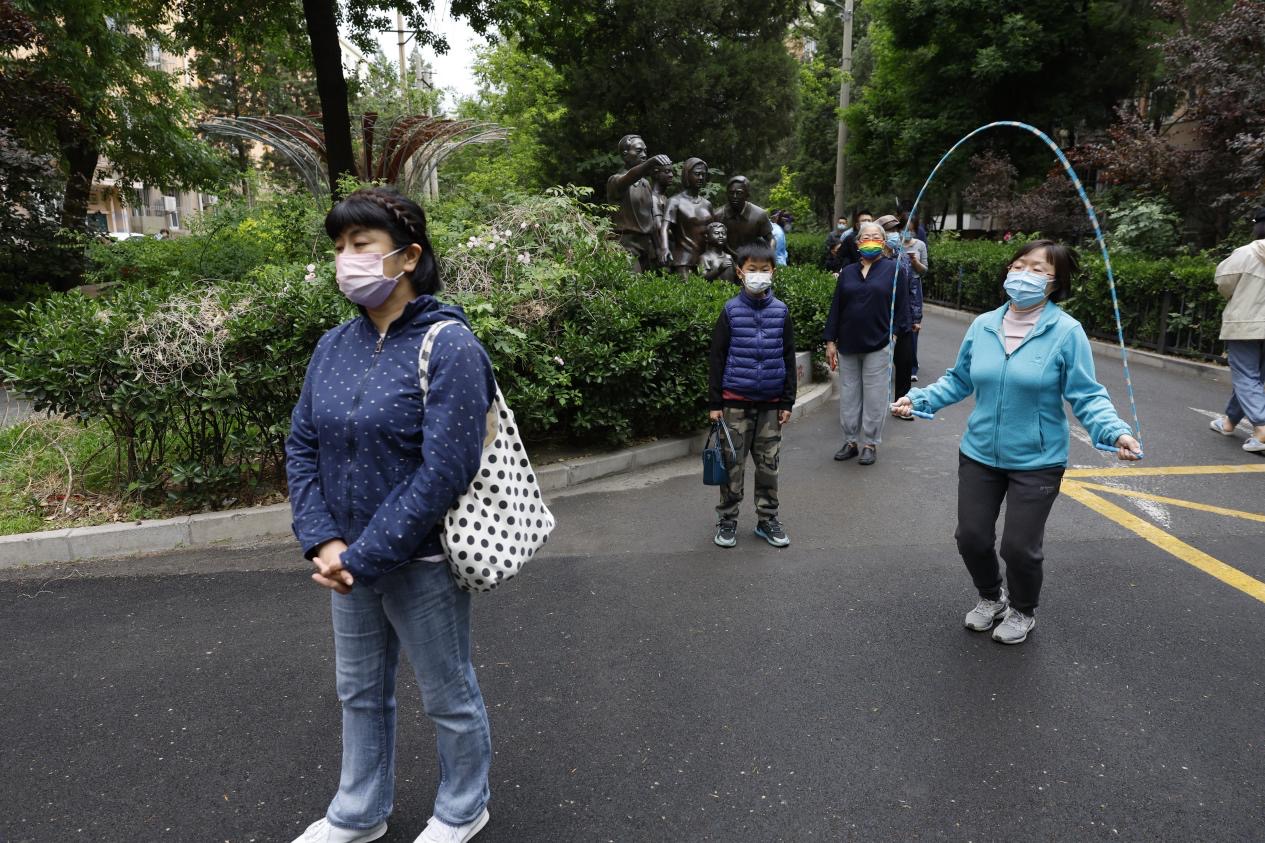
Comprehensive actions"
The fight against the epidemic is a people's movement," a spokesperson of the Beijing municipal government said during a press conference on May 12. Fortunately, with a common goal in mind, people from all walks of life in the city are actively involved in various aspects of the campaign.
"I never consider myself to be a disabled person when I work on anti-epidemic tasks. I hope to help others as much as I can without causing them any trouble to be united in a concerted effort to help Beijing fight the virus faster," Ma Erdong, 40, a committee member with disabilities from the Capital Normal University community in Haidian district, told the Global Times.
After the start of the current outbreak, Ma volunteered to be a part of the verification of the information and health condition of the community residents as provided in the Beijing Health Kit. Because of her visual impairment, she specially prepared a magnifying glass to check the data. So far, she has worked nonstop for more than two weeks.
"Our community is full of staff like me who love Beijing and love their homes. Beijing is a gracious and caring city for the disadvantaged. I have been helped by many people in the past, so now, I want to give myself back to the community," she added.
There are plenty of people like Ma in Beijing.
Since April 24, more than 400 agents from real estate brokerage company 5I5j Holding Group (5I5j) in Beijing formed an emergency supply volunteer service team, monitoring the supply of household goods in the market three times a day to ensure the city's orderly supply and stability of prices of daily goods. By May 1, they had visited 2,995 stores, 184 enterprises, and had collected more than 850 reports on key-point products, a fellow from 5I5j told the Global Times.
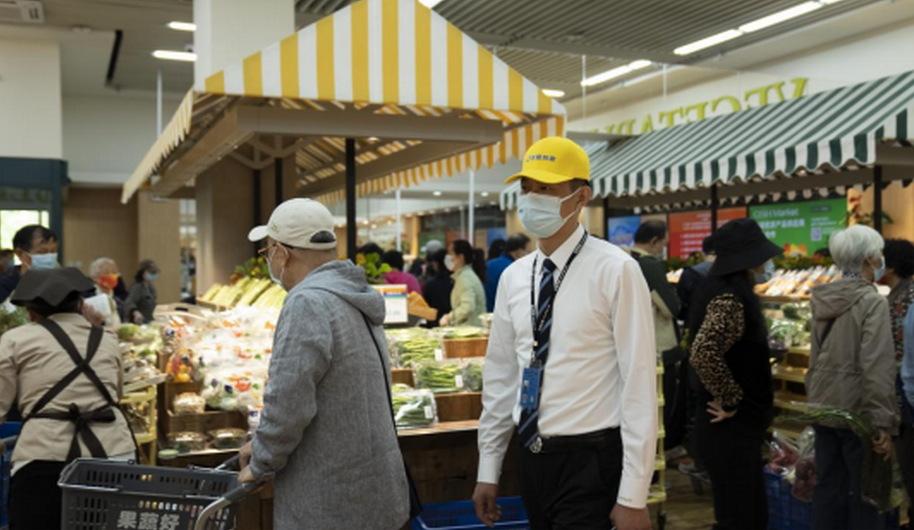
Led by Wang Yidong, head of the Nanmofang Veterans Service Station in Chaoyang district, more than 100 retired servicemen joined the Capital Veterans Volunteer Team and provided more than 31 tons of goods to over 30,000 people in six communities in Chaoyang in the temporary control zones.
Spiritual outlook of the capital
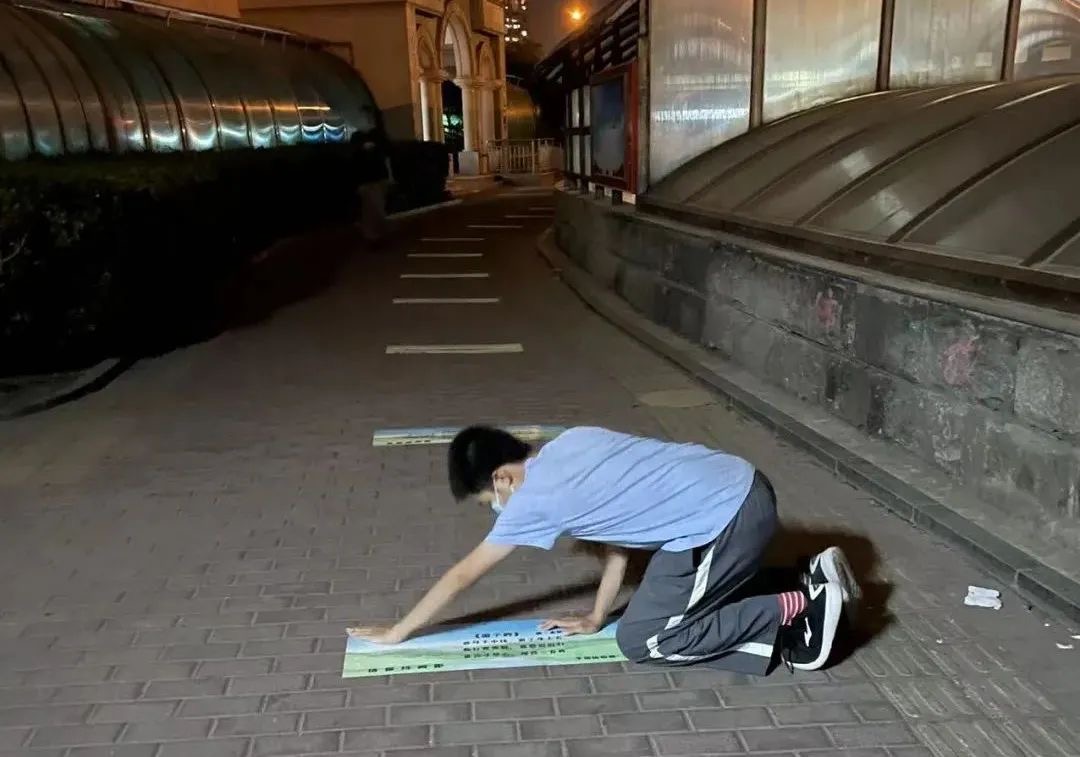
The idea came from Shen's careful observation during nucleic acid testing. "When I saw that the chalk lines on the ground at the testing site had blurred, and volunteers kept reminding everyone to keep their distance. I thought I can put something on the ground to help people pass the time while waiting and remain separate from the crowd," Shen told the Global Times.
On May 4, China's Youth Day, Shen printed nearly 40 stickers with his New Year gift-money and pasted them one by one at the nucleic acid testing site in the Lianhua community of Haidian district.
The catchy classical poems made the two-meter line more eye-catching and also embellished the otherwise boring queuing time of the locals. Many residents put down their phones and read the poems at their feet with interest, while some parents stopped by to explain the verses to their children.
Netizens pointed out that this heartwarming action has presented the civilized image of Beijingers, the culture and character of the city.
Shen said he has told the community that he would like to volunteer to further serve the community in his spare time.
The government of the capital is equally grateful to the people. On May 5, the Beijing Municipal People's Government sent a letter of thanks, paying high respect and sincere gratitude to all the citizens of Beijing, and stressing that it will continue to listen to the opinions and suggestions of the public to promptly address people's concerns on the epidemic and continuously improve its work to minimize the impact on the work and life of the public.
Over the past two years, the Chinese people have felt the benefits and efficacy of China's dynamic zero-COVID policy, Cheng said. "In Beijing, the city that best embodies the spirit of China, there are too many honorable, lovable people who continue to practice this principle, guarding and decorating the city, doing their part to make society return to the state it was before the epidemic, a day that we believe is not far away from now," she noted.
Yang Kaibo, Xie Chunyang, Meng Fanhui , Zhang Changchang contributed to this story
The current wave of the Omicron variant has hit Beijing hard, with the most severe and complicated epidemic prevention and control situation in its history. However, the confidence and strength of the city's nearly 22 million residents to help each other is effectively building a stronger barrier against the epidemic.
Instead of the resentment and self-abandonment imagined by some Western media, the general public in Beijing maintained high trust in the government and actively cooperated with preventive measures such as frequent nucleic acid screenings.
"Beijing, the gateway and political center of China, must not lose ground in the battle against the epidemic." This is strongest shared belief of the residents at the moment.
'Chaoyang masses' at service
Residents of Chaoyang district have long had an image of "Chaoyang masses" - retired "aunties" and "uncles" in residential compounds with red armbands overseeing community management. But the story of Yang Na, a COVID-19 epidemic prevention and control volunteer at Xiaohongmen community of Chaoyang district, went viral on Chinese social media because of a "drag show" she performed on her wedding day in a lockdown community.
There was no wedding dress or banquet on May 8, Yang's wedding day. At 11:30 am, after finishing her work, Yang took off her protective clothing and hurried to the flat of her in-laws in the same compound. She put on her husband's red T-shirt and headed to a dinner party with her family to complete a special wedding ceremony in the simplest way. At 1 pm, she was back on duty and continued to provide medication to residents.
"Although it is a pity that we could not hold a grand wedding, it is also a memorable thing to spend the first day of our marriage under the post of epidemic prevention and control," Yang told the Global Times.
In April, the sudden outbreak in Beijing disrupted Yang's wedding plans, which she had prepared for a year in advance. However, she decisively responded to Beijing's call by canceling the feast and signed up as a community volunteer to provide residents with services such as purchasing medicine, picking up and delivering packages, and entering homes for nucleic acid sampling.
There are 14 buildings in Yang's community, each with about 800 residents, but so far there have been no complaints.
"Chaoyang residents have always had a sense of responsibility and duty. Not only can the residents of Beijing's largest district contain criminal offenders, but also our performance against the epidemic was quite excellent," Yang said.
In the past, people who offered tip-offs were dubbed Chaoyang vigilantes, and they reported high-profile entertainers engaged in illicit activities such as prostitution and drug use. They were later called jokingly by netizens as a mysterious force that could match famous international intelligence organizations like as the MI6.
It has been proven that when Chaoyang's residents focused their attention on the struggle against the virus, with understanding, support and cooperation, as well as actively contributing their own resources to the COVID-19 prevention and control work, a strong anti-epidemic synergy was formed.
"There are volunteers joining us continuously every day," said Cheng Chen, a post-1990s community youth club social worker, now a group leader of volunteer working in one of the nucleic acid testing sites in Chaoyang's Taiyanggong community, who wake up at 5:30 am every day to get to work.
The testing site in front of the Taiyanggong Community's Party branch is the "battleground" for Cheng to contain the virus.
Cheng Chen disinfects a nucleic acid testing site at the Taiyanggong community in Beijing on May 12, 2022. Photo: Courtesy of Cheng Chen
"The 'Chaoyang masses' have a new look now, with many young people who work from home coming to ask what they can do to help our work during the ongoing nucleic acid testing," Cheng said, noting that up to now, her community has done over 15 rounds of nucleic acid tests.
"The queue is more and more organized and people's mood is growingly optimistic, and standing on the frontline with the 'Chaoyang masses' has especially motivated me to work and has given me inspiration," Cheng said.
A citizen jumps rope at a nucleic acid testing site in Chaoyang's Shijingshan district on May 6. Photo: Li Hao/GT
Comprehensive actions"
The fight against the epidemic is a people's movement," a spokesperson of the Beijing municipal government said during a press conference on May 12. Fortunately, with a common goal in mind, people from all walks of life in the city are actively involved in various aspects of the campaign.
"I never consider myself to be a disabled person when I work on anti-epidemic tasks. I hope to help others as much as I can without causing them any trouble to be united in a concerted effort to help Beijing fight the virus faster," Ma Erdong, 40, a committee member with disabilities from the Capital Normal University community in Haidian district, told the Global Times.
After the start of the current outbreak, Ma volunteered to be a part of the verification of the information and health condition of the community residents as provided in the Beijing Health Kit. Because of her visual impairment, she specially prepared a magnifying glass to check the data. So far, she has worked nonstop for more than two weeks.
"Our community is full of staff like me who love Beijing and love their homes. Beijing is a gracious and caring city for the disadvantaged. I have been helped by many people in the past, so now, I want to give myself back to the community," she added.
There are plenty of people like Ma in Beijing.
Since April 24, more than 400 agents from real estate brokerage company 5I5j Holding Group (5I5j) in Beijing formed an emergency supply volunteer service team, monitoring the supply of household goods in the market three times a day to ensure the city's orderly supply and stability of prices of daily goods. By May 1, they had visited 2,995 stores, 184 enterprises, and had collected more than 850 reports on key-point products, a fellow from 5I5j told the Global Times.
A property agent from 5I5j Holding Group checks supplies at a supermarket in Chaoyang district on May 1. Photo: Courtesy of 5I5j Holding Group
Led by Wang Yidong, head of the Nanmofang Veterans Service Station in Chaoyang district, more than 100 retired servicemen joined the Capital Veterans Volunteer Team and provided more than 31 tons of goods to over 30,000 people in six communities in Chaoyang in the temporary control zones.
Spiritual outlook of the capital
On May 4, Shen Junbo pastes the separation lines printed with Chinese poems at a nucleic acid testing site in his community. Photo: Courtesy of Shen Junbo
Shen Junbo, a 16-year-old high school student, recently went viral for making 2-meter crowd dividers with Chinese poems at his own expense and pasting them at the nucleic acid testing site in his neighborhood.The idea came from Shen's careful observation during nucleic acid testing. "When I saw that the chalk lines on the ground at the testing site had blurred, and volunteers kept reminding everyone to keep their distance. I thought I can put something on the ground to help people pass the time while waiting and remain separate from the crowd," Shen told the Global Times.
On May 4, China's Youth Day, Shen printed nearly 40 stickers with his New Year gift-money and pasted them one by one at the nucleic acid testing site in the Lianhua community of Haidian district.
The catchy classical poems made the two-meter line more eye-catching and also embellished the otherwise boring queuing time of the locals. Many residents put down their phones and read the poems at their feet with interest, while some parents stopped by to explain the verses to their children.
Netizens pointed out that this heartwarming action has presented the civilized image of Beijingers, the culture and character of the city.
Shen said he has told the community that he would like to volunteer to further serve the community in his spare time.
The government of the capital is equally grateful to the people. On May 5, the Beijing Municipal People's Government sent a letter of thanks, paying high respect and sincere gratitude to all the citizens of Beijing, and stressing that it will continue to listen to the opinions and suggestions of the public to promptly address people's concerns on the epidemic and continuously improve its work to minimize the impact on the work and life of the public.
Over the past two years, the Chinese people have felt the benefits and efficacy of China's dynamic zero-COVID policy, Cheng said. "In Beijing, the city that best embodies the spirit of China, there are too many honorable, lovable people who continue to practice this principle, guarding and decorating the city, doing their part to make society return to the state it was before the epidemic, a day that we believe is not far away from now," she noted.
Yang Kaibo, Xie Chunyang, Meng Fanhui , Zhang Changchang contributed to this story
